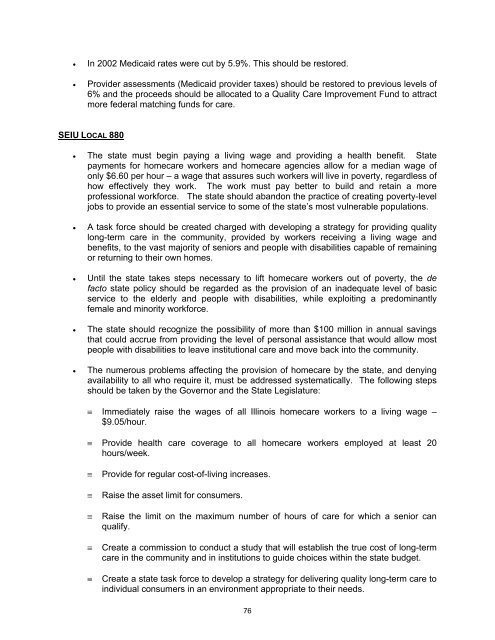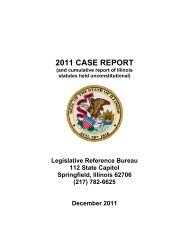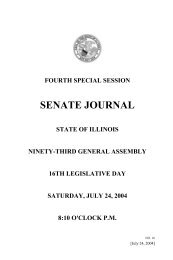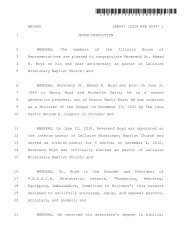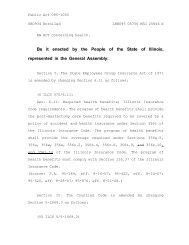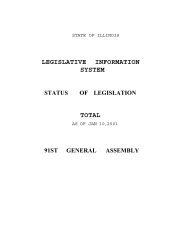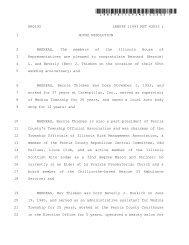Long-Term Care - Illinois General Assembly
Long-Term Care - Illinois General Assembly
Long-Term Care - Illinois General Assembly
You also want an ePaper? Increase the reach of your titles
YUMPU automatically turns print PDFs into web optimized ePapers that Google loves.
• In 2002 Medicaid rates were cut by 5.9%. This should be restored.<br />
• Provider assessments (Medicaid provider taxes) should be restored to previous levels of<br />
6% and the proceeds should be allocated to a Quality <strong>Care</strong> Improvement Fund to attract<br />
more federal matching funds for care.<br />
SEIU LOCAL 880<br />
• The state must begin paying a living wage and providing a health benefit. State<br />
payments for homecare workers and homecare agencies allow for a median wage of<br />
only $6.60 per hour – a wage that assures such workers will live in poverty, regardless of<br />
how effectively they work. The work must pay better to build and retain a more<br />
professional workforce. The state should abandon the practice of creating poverty-level<br />
jobs to provide an essential service to some of the state’s most vulnerable populations.<br />
• A task force should be created charged with developing a strategy for providing quality<br />
long-term care in the community, provided by workers receiving a living wage and<br />
benefits, to the vast majority of seniors and people with disabilities capable of remaining<br />
or returning to their own homes.<br />
• Until the state takes steps necessary to lift homecare workers out of poverty, the de<br />
facto state policy should be regarded as the provision of an inadequate level of basic<br />
service to the elderly and people with disabilities, while exploiting a predominantly<br />
female and minority workforce.<br />
• The state should recognize the possibility of more than $100 million in annual savings<br />
that could accrue from providing the level of personal assistance that would allow most<br />
people with disabilities to leave institutional care and move back into the community.<br />
• The numerous problems affecting the provision of homecare by the state, and denying<br />
availability to all who require it, must be addressed systematically. The following steps<br />
should be taken by the Governor and the State Legislature:<br />
≡ Immediately raise the wages of all <strong>Illinois</strong> homecare workers to a living wage –<br />
$9.05/hour.<br />
≡ Provide health care coverage to all homecare workers employed at least 20<br />
hours/week.<br />
≡<br />
≡<br />
Provide for regular cost-of-living increases.<br />
Raise the asset limit for consumers.<br />
≡ Raise the limit on the maximum number of hours of care for which a senior can<br />
qualify.<br />
≡<br />
≡<br />
Create a commission to conduct a study that will establish the true cost of long-term<br />
care in the community and in institutions to guide choices within the state budget.<br />
Create a state task force to develop a strategy for delivering quality long-term care to<br />
individual consumers in an environment appropriate to their needs.<br />
76


